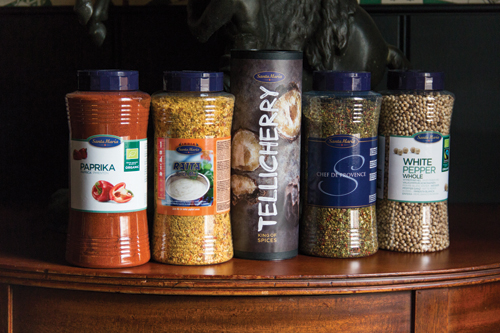Spices spell magic
Dry store ingredients are often under-appreciated, but where would our celebrated chefs be without their spices? Eight big names were invited to impart flavour to The Caterer's wide-ranging roundtable discussion. Kathy Bowry reports
The panel
- Dipna Anand Co-owner and cookery school trainer, Brilliant Restaurant, chef-lecturer, University of West London, and author
- Barnaby MacAdam Concept chef, Santa Maria Foodservice
- Pieter Fitz-Dreyer Head chef, Chiswell Street Dining Rooms
- Hayden Groves Foodservice Cateys 2015 Chef of the Year and executive chef at BaxterStorey
- Rob Kurz
- Jeremy Pang Chef and author of Chinese Unchopped
- Jordan Sclare Group chef, Chotto-Matte and Bouillabaise
- James Walters Chef and restaurateur, Arabica Bar & Kitchen
For chefs with imagination, their raison d'etre is to weave magic with top-quality ingredients, creating dishes that lift diners' eating experiences from the extraordinary to the sublime.
What became abundantly clear during this roundtable was that The Caterer's panel of spice-loving chefs all believe passionately that spices are integral to any kitchen.
According to Eimear Owens - country sales manager, UK and Ireland at Santa Maria Foodservice - they are right on-trend as consumer demand is growing for spicier foods and variety on menus. "Street food is still driving food innovation in the UK and Europe, so spices are pivotal to the type of menu dishes that consumers want to eat and they are willing to pay more for them," she says.
The panel agreed that because street food is accessible on all levels - with adventurous food and flavours available at under £10 a head, the trend has bridged the gap between restaurants and home foods and exposed more diners to the magic of spices than anything else since the arrival of Indian and Chinese takeaways in the UK.
British street food is now incredibly varied and masses of spices are used, mirroring the practices of Vietnamese street food. Now, like in Singapore as just one example, it is not unusual in major towns and cities to see one stall serving fragrant duck roasts, while next door you can tuck into laksa to go.
Pieter Fitz-Dreyer
High five for flavour
Each of the panel's top five ingredients make for some interesting flavour combinations.
For Jeremy Pang, it has to be the ubiquitous Chinese five spice, a combination of star anise, cloves, cinnamon, fennel seeds and Sichuan pepper. "Counting five spice as one choice, I also love to use garlic, ginger powder and the dried pith of mandarin, which brings out the sweetness of other spices. It has a deep flavour, but a bitter aroma, so not best used on its own."
Jordan Sclare cannot do without fennel seeds, which he finds indispensable for bouillabaisse. Huacatay, also knows as Peruvian black mint, is another favourite. "Coriander, wasabi and soy make up the list. The latter two, blended with rice wine vinegar for a dressing, simply cut through fat."
Dipna Anand cannot do without turmeric, chilli powder, fenugreek and garum masala. "The latter is an amalgam of 12-15 spices. My recipe is from my grandfather and a closely guarded family secret. A tip for garum masala is only add half a teaspoon towards the end of cooking - the first rule in Indian cooking is powdered spices and herbs go in late in the process, whole spices at the beginning in the oil."
Jordan Sclare
Pieter Fitz-Dreyer favours a seasonal approach to ingredients, using Mediterranean ingredients in summer, such as smoked paprika and fresh oregano. "Winter game and dishes such as mallard benefit from five spice," he says. Also on his list is Middle Eastern za'atar - a spice blend consisting of ground sesame seeds, oregano, marjoram, sumac, salt and cumin.
Meanwhile, Rob Kurz likes nothing better than ripping up fresh herbs and then complementing them with smoked paprika - "rubbed on meat braised over an open flame or using dry heat" - and cumin and coriander. "I also like to use spices in different places - for example, in chocolate and chilli muffins. Spices are like instruments in an orchestra adding percussion. No single note is heard - it's the whole combination."
Hayden Groves also jumps in herbs-first for his favourite larder ingredients. "Rosemary, thyme, fresh bay and then cinnamon and vanilla. The kind you can snap. Plus, of course, black pepper - but real good stuff."
Rob Kurz
James Walters favours nutmeg and sumac. "Sumac is an incredible spice, the best of which comes from Jordan because of the intensity of the sun and it's the perfect terroir. Sumac is incredible - it's known as the lemons of God." Walters also chose dried Persian thyme ("triple the price of the Jordanian version - and it tastes so different") and oregano ("different tastes, different variants").
A happy shelf life
Walters says you must "invest in dry ingredients in your larder for all cooking styles."
However, Groves, for whom pepper is the starting point in any larder, warns it is important not to fill up the store with too many varrieties as they lose their virility, and adds that you really need to know what to use.
Santa Maria's Barnaby MacAdam says: "Pepper is such a staple in many restaurants - it's the only spice on the table. The flavour of Tellicherry is unique; still familiar, but somehow heightened and more aromatic. It shouldn't be used as a seasoning, it should be used as an ingredient in its own right."
Sclare believes it's all down to education and experience and Fitz-Dreyer wholeheartedly concurs, adding: "Teaching the brigade about colours and aromas - and texture - is really important. That way they learn 'no label, no colour, no aroma - its no good!'."
Kurz believes you get what you pay for.
Jeremy Pang
Front of house
Pang has no problem with diners wishing to add their own condiments post-cooking. "I have a low salt palate myself and tend not to overdo it in cooking, so I'm very happy to put it on the table. Let people have the chance to throw a bit of salt around. Why not?"
Walters comments that anyone wanting salt and pepper on the table is welcome to it, but there is an expectation for chefs to get the balance right.
Sclare mentions sansho pepper, which is actually the unripened, round, green seedpods of the Japanese prickly ash. "Tap the seedpod with one finger and it goes on top of sushi. While recently in Greece, I found fresh oregano and lemon on every table. No salt or pepper. It will come over here."
Cardamom is one spice that everybody enthuses about except Sclare, who says emphatically: "NOT with fish!" However, Anand disagrees, maintaining that cardamom seed is essential in any fish or chicken dish along with coriander.
Groves enthuses about star anise for red meats and when cooking carrots in carrot juice. Meanwhile, for Sclare, fennel seed kicks everything else off the shelf.
Pang comments: "Salt, sugar and chilli ground into a powder gives umami - the fifth taste."
Groves advocates turmeric used with caution in many dishes while Anand votes for fenugreek, which can rebalance a dish if too much chilli or salt has been used, she says.
James Walters
Educating sedate Brits
Groves believes in the UK if people want something different they will make their way to a restaurant that offers it. "It's a destination thing, they will come to you."
Pang believes that with Chinese food especially, people have been trained to takeaway tastes. "It has taken six years for people to get used to lotus chicken and it took four years to get beggar's chicken on the menu."
Fitz-Dreyer says: "The world is opening up, but there is still a long way to go."
Kurz informs that chefs are being challenged in business and industry catering: "For example, if you have a directors' lunch they expect the same flavours they get in top restaurants. No more chicken breast wrapped in Parma ham. Palates are changing and that's a great thing."
Groves' experience is that London staff can dine out on amazing food that they then want replicated in offices, where they may just have 25 minutes to consume it.
Walters say Middle Eastern flavours are finding their place in British cuisine now. "Yes, we need to educate palates and people, but we also need to remember that if they come to enjoy themselves in our restaurants, maybe they don't want the lectures."
Dipna Anand
Experiment and learn
Hayden Groves Order the minimum amount of herbs and spices - you don't want to be left with a load of stuff you can only identify by carbon dating.
James Walters Find classic, traditional and authentic recipes from a trusted source and follow them precisely. Keep tasting all the way through the cooking process. When you have it right, that's when the creativity can start.
Jeremy Pang Education in putting tastes together is very important. Veering away from a recipe is often a good thing, and don't be afraid to make mistakes.
Dipna Anand Don't be afraid to experiment. If you don't have one particular spice, use another. Be careful about salt and chilli.
Pieter Fitz-Dreyer Respect the ingredients and use them to build layers of taste.
Rob Kurz Be open-minded and don't make assumptions - remember that curry has flavour as well as heat. Carry on learning and be thieves with your eyes.
Jordan Sclere Eat the food yourself before attempting dishes to put it in front of anybody else. Eat out and try everything.
Hayden Groves
Tasty generations
Research for the Age Cohort Report, conducted by Allegra Foodservice on behalf of roundtable sponsor Santa Maria Foodservice, grilled 2,000 consumers across four generations about their eating habits and flavour preferences.
The groups were: Millennials aged between 18-34; Generation X aged between 35-49; Baby Boomers aged between 50-64; and the War Babies aged 65-plus. The results show distinct differences in their eating-out habits and flavour preferences.
Millennials eat out three times as much as War Babies. And they're eating everywhere - at home, at work, and out and about. Of these, 21% see eating out as the new going out. They like to try something new, especially food that's sweet, salty or sour. They are also the most cost-conscious, with 47% put off trying something new because of the cost.
Generation X has a relatively higher household income and likes strong, savoury flavours. Over a quarter like to regularly try something new when they go out.
Baby Boomers love a medium/hot curry the most and are more adventurous with hot and spicy foods than any other generation.
War Babies are comparatively less well-off, with one third having an income of less than £20,000. Almost half prefer to eat British cuisine when eating out.
The report found all age groups prefer bolder and spicier flavours more now than three years ago.
Nearly half of all Millennials said they liked spicy food more now than three years ago and Baby Boomers led the field, with 80% saying they enjoy spicy foods, with Indian food in their top three when eating out.
Barnaby MacAdam
History lesson
Romano-British tables were once enlivened by the presence of garlic, ginger, cinnamon and nutmeg brought over by our Mediterranean conquerors, along with rabbits and chickens to enliven the native grain-based diet. Among the many herbs that they introduced to Britain were rosemary, thyme, bay and basil.
More than 1,000 years later, Queen Elizabeth I signed the charter to the English East India Company on the last day of the 16th century, which resulted, two years later, in the delivery of a cargo of 1,030,000lb of pepper from the East Indies.
Since then, London has consolidated its position at the heart of the spice trade and today is still madly in love with pepper. However, it is open to myriad new taste experiences from all over the world, and the British diner is enthusiastically embracing the many spices used in inventive cuisine.
Sponsor: Santa Maria Foodservice
The Caterer's roundtable sponsor, leading spice expert Santa Maria Foodservice, is on a mission to spice up the creative chef's larder with quality ingredients.
The company, which sees itself as the go-to partner for operators' spice needs, intends to raise the profile of spices in general and promote their benefits and individual characteristics.
http://santamariafoodservice.com/uk
Continue reading
You need to be a premium member to view this. Subscribe from just 99p per week.
Already subscribed? Log In





















